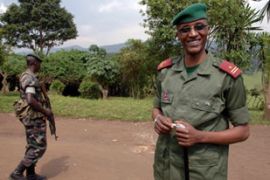DR Congo ‘facing full-fledged war’
Clashes between the army and a renegade general resume after short-lived ceasefire.

“We were attacked at 7:15am (0515 GMT) by Nkunda loyalists commanded by Pascal Bisamena. They fired on our troops … and burned huts at our positions in the Kokwe and Ruvuru hills,” an officer in the army’s 9th Brigade told the AFP news agency.
“Combat continues, we are fighting to retake our positions.”
Negotiations ‘wanted’
Nkunda told Reuters news agency that government forces had attacked his positions first.
| “We want to negotiate, but it seems for them [the army] it is a strategy to buy time to reinforce” General Laurent Nkunda, renegade commander |
Nkunda said he was still ready to respect the ceasefire.
“We want to negotiate, but it seems for them [the army] it is a strategy to buy time to reinforce,” he said.
But there appeared to be some confusion over how wide an area the pact was supposed to cover. UN peacekeepers said on Thursday they had persuaded Nkunda’s fighters to pull back from Sake, just 20km from Goma.
“The ceasefire was just local to Sake … We’re concentrating our efforts there and in other major population areas,” Gabriel Debrosse, a UN military spokesman in Kinshasa, said.
Thousands displaced
The UN World Food Programme, which is trying to provide emergency rations to people displaced by the fighting, said the surge in violence was uprooting more people every day.
It said an estimated 40,000 people had fled in recent days on top of 200,000 displaced since December.
The east of the country has long struggled amid violence between local militias, renegade soldiers and the army.
The region was once nominally controlled by rival rebel factions who later signed a peace deal with the government to end the war, which lasted from 1998 to 2002.